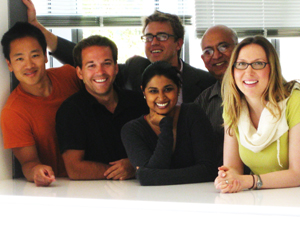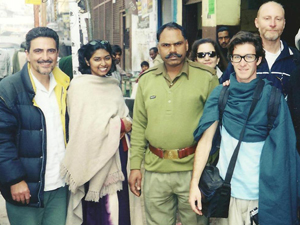GRAIN Hopes to Sow Sustainable Success in Developing World
By Tiffany Fox, (858) 246-0353, tfox@ucsd.edu
San Diego, CA, May 19, 2009 — A new multidisciplinary initiative is taking seed at the University of California, San Diego, and with support from the university's California Institute for Telecommunications and Information Technology (Calit2), its organizers hope to reap a harvest of self-directed improvements in the developing world.
GRAIN, or the Global Responsibility and Innovation Network, is the brainchild of a number of Calit2-affiliated graduate and post-graduate researchers. GRAIN President and co-founder Shivani Singh says the goal of the independent non-profit is to create a GRAIN network — an online collaboration between academic, private and professional communities, as well as developing societies — to help improve the way those societies define their most challenging problems so they can cultivate their own solutions.
Singh, who recently earned her M.S. in nanotechnology from UC San Diego's Department of Materials Science and Engineering, says that many corporations, governments, agencies, and professionals are already collaborating to innovate social solutions, but aren't always successful.
|
"This is because we — the innovators — think that if someone has a problem, that automatically means they don't know how to fix it," she explains. "We assume that if they had known the solution to their problem, they would have done it already. Most of the time they lack the resources to implement the solution or to scale it.
"However, after many years of market research, we have come to realize that for social innovation to truly serve the needs of the end-users, and for it to have a sustainable impact, it must begin with the end-user. It is up to us, the innovators, to help the end-users co-define their problem, and incorporate their feedback in the solutions life-cycle for optimum results. "
So how do innovators (known as "Grainiacs") connect with end-users in this bottom-up approach? That's where technology developed at Calit2 comes in. The members of GRAIN plan to adapt the computational algorithms developed for Calit2's Research Intelligence Portal (which is now used by the entire UCSD campus) to create an online GRAIN tool that will allow innovators to identify themselves on an online network according to their affiliations, expertise, passion, global concerns, and geographic interests.
Once an innovator decides to initiate a social design project, the GRAIN Tool will match him with agencies that will connect him to possible end-users. Once the problem has been properly co-defined between the innovator and the end-users, the "GRAIN Online Project Manager" will become activated, and connect the innovators with other possible Grainiacs such as students, faculty, researchers, professionals, NGOs, and investors who are interested in the same global solution, methodology or geographic area.
"This tool allows the innovator to spend less time searching through everybody on the network who would possibly help them," says Singh, "and more time dialoguing and collaborating."
Sukumar Srinivas, Calit2's community program manager and a member of the GRAIN advisory board, sees GRAIN as a way for students in both the U.S. and abroad to make a difference in the world.
"This is a very exciting opportunity for undergraduates and graduate students to be able to leverage this network and get exposed to possible ways of dealing with real-life issues faced by over 4 billion people in the world," he says. "This type of experience and the empathy and compassion that it generates in young hearts will have a lasting impression in their life."
The idea for GRAIN stemmed from a "Design for Development" course taught at UC San Diego by Derek Lomas, co-founder of GRAIN and Playpower.org, a non-profit organization seeking to develop educational software for a low-cost gaming platform that sells for less than $12. Playpower is precisely the type of project GRAIN embraces: It uses readily available, low-cost, 8-bit technology to provide a computer-assisted learning environment for users in developing economies.
|
Rather than rely on an established software company to develop content for the Playpower platform, the users themselves manipulate the technology to create relevant content. A community in Ghana, for example, might use a simple Playpower program — the equivalent of Microsoft PowerPoint — to create an open-source English spelling game. That game could later be adapted for use by Portuguese-speaking Brazilians simply by adding a different set of vocabulary words and different graphic representation.
"Throughout the entire process of GRAIN project development — from idea to implementation — the end-users are involved in the input, feedback, and integration of the solution that is being created," notes Singh. "This process is called 'co-innovation,' a process GRAIN deems the only answer to present limitations in social innovation.
"Millions of dollars of research, time, and resources can be saved through this co-innovation process, ensuring a higher success rate of implementation into the society of the end users," she adds. "This also empowers the end users to further innovate and improve on the solutions as their needs change."
Currently, GRAIN has 15 members and three projects in the "incubator phase," including:
- The Avisha Initiative, a long-term global project designed by Singh with the Avisha Center for Well-Being at the Journaling Institute. The Initiative will offer women affordable and convenient at-home programs to improve their health and well-being when they do not have access to regular personalized care.
- Co-innovation with NGOs and other research institutes to offer affordable, durable and comfortable prosthetics for amputees in the developing world.
- Entrepreneurship Resource Program in Sri Lanka, led by GRAIN Board Director, Sujata Emani and the Chinmaya Organization for Rural Development. This program is a collaboration of South Indian cotton providers and micro-financiers to facilitate women entrepreneurs in the tsunami-torn region of Sri Lanka
Singh is quick to clarify that GRAIN does not give a hand-out, but a hand-up in the form of a networking tool.
"It's a way for universities, industries and organizations around the world to leverage their passion, expertise, and wherewithal, to directly affect positive social change," she notes. "We may not be able to singlehandedly eliminate AIDS or other problems, but through GRAIN we can contribute our ideas, research, and resources to collectively come up with affordable, culturally inclusive and sustainable social solutions."
Become a "Grainiac"
For further details or to become a member of GRAIN, go to: http://grainium.org.
Media Contacts
Tiffany Fox, (858) 246-0353, tfox@ucsd.edu
Related Links



